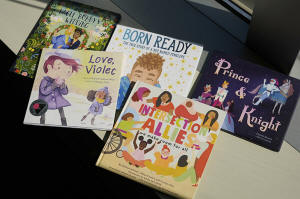Supreme Court says Maryland parents can pull their kids from public
school lessons using LGBTQ books
[June 28, 2025]
By MARK SHERMAN
WASHINGTON (AP) — The Supreme Court ruled on Friday that Maryland
parents who have religious objections can pull their children from
public school lessons using LGBTQ storybooks.
With the six conservative justices in the majority, the court reversed
lower-court rulings in favor of the Montgomery County school system in
suburban Washington. The high court ruled that the schools likely could
not require elementary school children to sit through lessons involving
the books if parents expressed religious objections to the material.
The lack of an “opt-out,” Justice Samuel Alito wrote for the court,
“places an unconstitutional burden on the parents' rights to the free
exercise of their religion.”
Justice Sonia Sotomayor wrote in dissent for the three liberal justices
that exposure to different views in a multicultural society is a
critical feature of public schools. “Yet it will become a mere memory if
children must be insulated from exposure to ideas and concepts that may
conflict with their parents’ religious beliefs,” Sotomayor wrote.
“Today’s ruling ushers in that new reality.”

The decision was not a final ruling in the case, but the justices
strongly suggested that the parents will win in the end. The court ruled
that policies like the one at issue in the case are subjected to the
strictest level of review, nearly always dooming them.
The school district introduced the storybooks, including “Prince &
Knight” and “Uncle Bobby’s Wedding,” in 2022 as part of an effort to
better reflect the district’s diversity. In “Uncle Bobby’s Wedding,” a
niece worries that her uncle won't have as much time for her after he
gets married to another man.
The justices have repeatedly endorsed claims of religious discrimination
in recent years, and the case is among several religious-rights cases at
the court this term. The decision also comes amid increases in recent
years in books being banned from public school and public libraries.
Many of the removals were organized by Moms for Liberty and other
conservative organizations that advocate for more parental input over
what books are available to students. Soon after President Donald Trump,
a Republican, took office in January, the Education Department called
the book bans a “hoax” and dismissed 11 complaints that had been filed
under Trump's predecessor, President Joe Biden, a Democrat.
[to top of second column]
|

A selection of books featuring LGBTQ characters that are part of a
Supreme Court case are pictured, April, 15, 2025, in Washington. (AP
Photo/Pablo Martinez Monsivais, File)

The writers’ group PEN America said in a court filing in the Maryland
case that the objecting parents wanted “a constitutionally suspect book
ban by another name.” PEN America reported more than 10,000 books were
banned in the last school year.
“By allowing parents to pull their children out of classrooms when they
object to particular content, the justices are laying the foundation for
a new frontier in the assault on books of all kinds in schools,” said
Elly Brinkley, a lawyer for the group's U.S. Free Expression Programs.
“In practice, opt outs for religious objections will chill what is
taught in schools and usher in a more narrow orthodoxy as fear of
offending any ideology or sensibility takes hold."
Lawyer Eric Baxter, who represented the Maryland parents at the Supreme
Court, said the decision was a “historic victory for parental rights."
"Kids shouldn’t be forced into conversations about drag queens, pride
parades, or gender transitions without their parents’ permission,"
Baxter said.
Parents initially had been allowed to opt their children out of the
lessons for religious and other reasons, but the school board reversed
course a year later, prompting protests and eventually a lawsuit.
At arguments in April, a lawyer for the school district told the
justices that the “opt outs” had become disruptive. Sex education is the
only area of instruction in Montgomery schools that students can be
excused from, lawyer Alan Schoenfeld said.
The case hit unusually close to home, as three justices live in the
county, though they didn't send their children to public schools.
All contents © copyright 2025 Associated Press. All rights reserved
 |